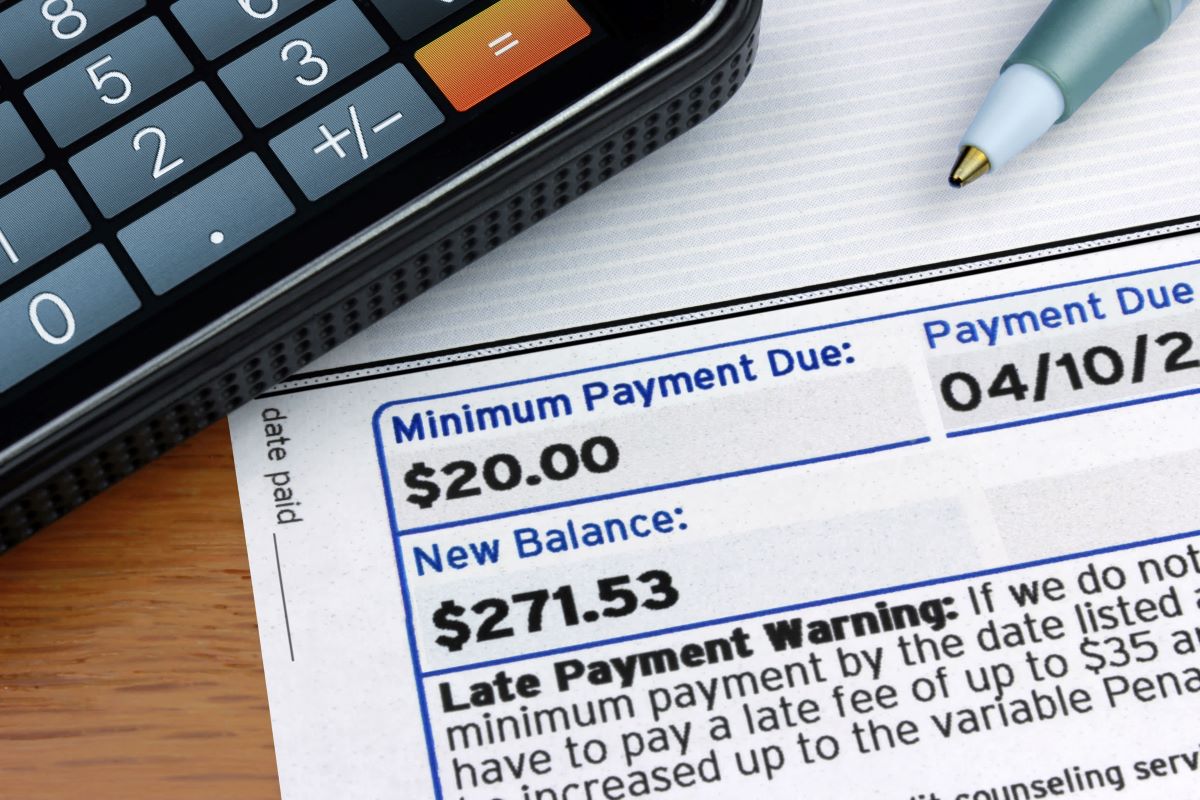Home>Finance>Why Do I Have To Pay A Late Fee For Business Registration Renewal


Finance
Why Do I Have To Pay A Late Fee For Business Registration Renewal
Published: February 22, 2024
Learn why late fees for business registration renewal are important for your finances and how to avoid them. Understand the impact on your business and finances.
(Many of the links in this article redirect to a specific reviewed product. Your purchase of these products through affiliate links helps to generate commission for LiveWell, at no extra cost. Learn more)
Table of Contents
**
Introduction
**
Welcome to the world of business ownership! As a business owner, you understand the importance of keeping your business in compliance with the necessary regulations and requirements. One of these essential obligations is the timely renewal of your business registration. While the process of renewing your business registration may seem straightforward, there are crucial aspects to consider to ensure that you fulfill this responsibility effectively.
Business registration renewal is a fundamental aspect of maintaining the legality and legitimacy of your business operations. It involves updating and confirming the information related to your business with the relevant authorities. This process typically occurs annually or biennially, depending on the regulations in your jurisdiction. Failure to adhere to the renewal deadlines can result in various consequences, including late fees, penalties, and potential disruptions to your business activities.
In this comprehensive guide, we will delve into the intricacies of business registration renewal, late fees, and the reasons behind tardy renewals. Additionally, we will explore the potential repercussions of delayed renewals and provide valuable tips to help you avoid incurring late fees. By understanding these critical aspects, you can navigate the business registration renewal process with confidence and ensure that your business remains compliant and operational.
Understanding Business Registration Renewal
Business registration renewal is a vital administrative task that ensures your business remains legally recognized and authorized to operate within a specific jurisdiction. The renewal process involves updating and verifying the information associated with your business, such as its legal structure, ownership details, contact information, and other pertinent data. This verification is crucial for government agencies to maintain accurate records of active businesses and enforce regulatory requirements effectively.
Depending on the location and legal structure of your business, the renewal period may vary. Some jurisdictions require annual renewal, while others mandate biennial or multi-year renewal cycles. It is imperative to familiarize yourself with the specific renewal timeline applicable to your business to avoid inadvertent delays or oversights.
When initiating the renewal process, you may be required to provide updated documentation, such as business licenses, permits, and any relevant certifications. Additionally, you might need to confirm the accuracy of your business’s financial information, including revenue figures and tax filings, as part of the renewal procedure.
Understanding the nuances of business registration renewal is essential for maintaining compliance and sustaining the legal standing of your business. By proactively engaging in the renewal process and adhering to the prescribed timelines, you can uphold the legitimacy of your business and avoid potential disruptions to your operations.
Late Fees and Penalties
Failure to renew your business registration within the specified deadline can lead to the imposition of late fees and penalties. These additional charges are intended to incentivize timely renewal and uphold regulatory compliance among businesses. Late fees are typically calculated based on the duration of the delay and may accrue on a daily, weekly, or monthly basis, depending on the regulations set forth by the governing authorities.
Penalties for overdue business registration renewal can extend beyond monetary fines and may include adverse repercussions such as the suspension of business operations, revocation of licenses, or legal actions. These penalties are designed to impress upon business owners the significance of fulfilling their renewal obligations promptly.
It is important to recognize that late fees and penalties can exert a considerable financial burden on businesses, particularly small enterprises and startups. Moreover, the associated administrative hurdles and potential reputational damage resulting from overdue renewals can disrupt business continuity and erode stakeholder confidence.
By comprehending the implications of late fees and penalties, business owners can appreciate the urgency of adhering to renewal deadlines and allocate the necessary resources and attention to this critical administrative task. Additionally, understanding the potential financial and operational ramifications of overdue renewals underscores the significance of proactive compliance with regulatory requirements.
Reasons for Late Renewal
Despite the importance of timely business registration renewal, various factors can contribute to the occurrence of late renewals. Understanding these reasons is crucial for devising strategies to mitigate delays and ensure prompt compliance with renewal requirements.
One prevalent reason for late renewal is the oversight or mismanagement of renewal deadlines. Amidst the myriad responsibilities that business owners contend with, the renewal date may inadvertently escape their attention, leading to unintentional delays. This can be exacerbated by insufficient organizational systems or the absence of proactive reminders to prompt the renewal process.
Additionally, changes within the business, such as alterations in ownership, leadership transitions, or relocations, can disrupt the continuity of renewal procedures. Failure to promptly update the relevant authorities regarding these changes can impede the renewal process and result in tardy submissions.
Furthermore, financial constraints or liquidity challenges may hinder businesses from allocating the necessary funds for renewal fees within the prescribed timeframe. In some cases, administrative complexities or bureaucratic hurdles within government agencies responsible for overseeing business registration can contribute to delays, despite the business owner’s proactive efforts.
Moreover, unexpected events or crises, such as natural disasters, economic downturns, or unforeseen operational disruptions, can divert the attention and resources of business owners, leading to inadvertent delays in attending to renewal obligations.
By recognizing these potential reasons for late renewal, business owners can implement proactive measures to mitigate these challenges and fortify their renewal processes. Establishing robust organizational systems, leveraging technology for automated reminders, and fostering a culture of compliance within the business can help address these underlying reasons and facilitate timely business registration renewal.
Consequences of Late Renewal
The repercussions of late business registration renewal can have far-reaching implications for the affected businesses. One of the immediate consequences is the imposition of late fees and penalties, which can significantly escalate the overall renewal costs. These financial burdens can strain the resources of businesses, particularly smaller enterprises, and impede their ability to allocate funds for essential operational needs and growth initiatives.
Delayed renewal can also lead to the suspension of business operations, as regulatory authorities may enforce sanctions to compel compliance. This suspension can disrupt revenue streams, erode customer confidence, and tarnish the reputation of the business, potentially resulting in long-term repercussions for its viability and market standing.
Furthermore, overdue business registration renewal can trigger legal ramifications, including the revocation of licenses and permits essential for conducting specific activities. This can restrict the business’s ability to engage in certain operations, rendering it non-compliant with industry regulations and impeding its competitive positioning.
Moreover, the administrative burdens stemming from late renewal, such as the need to rectify compliance deficiencies, address regulatory inquiries, and navigate potential legal proceedings, can divert valuable time and resources away from core business activities. This can hinder productivity, disrupt strategic initiatives, and strain the overall operational efficiency of the business.
Additionally, the reputational damage resulting from late renewal can undermine the trust and confidence of stakeholders, including customers, suppliers, and partners. It may convey an impression of negligence or instability, potentially deterring prospective business opportunities and partnerships.
By comprehending the multifaceted consequences of late renewal, business owners can appreciate the imperative of prioritizing timely compliance with registration requirements. Proactive measures to avoid late renewal can safeguard the financial stability, operational continuity, and reputation of businesses, reinforcing their long-term sustainability and growth prospects.
Tips to Avoid Late Fees
Proactively managing the business registration renewal process is essential for avoiding late fees and ensuring seamless compliance. By implementing the following tips, business owners can mitigate the risk of overdue renewals and navigate the process with efficiency and diligence.
- Calendar Reminders: Set up recurring calendar reminders well in advance of the renewal deadline to ensure that the process is initiated in a timely manner. Leveraging digital calendars or scheduling software can help automate these reminders and minimize the risk of overlooking renewal dates.
- Document Organization: Maintain a comprehensive record of all renewal-related documents, including previous submissions, correspondence with regulatory authorities, and relevant forms. This organized approach can streamline the renewal process and facilitate swift access to essential documentation.
- Engage Legal Counsel: Seeking guidance from legal professionals or business advisors with expertise in regulatory compliance can provide valuable insights into the renewal requirements specific to the business’s industry and jurisdiction. This proactive engagement can preemptively address potential compliance pitfalls and enhance the accuracy of renewal submissions.
- Financial Planning: Allocate funds for renewal fees in advance, incorporating these expenses into the business’s financial planning and budgeting processes. By earmarking the necessary resources for renewal, businesses can preemptively address potential liquidity constraints that might impede timely compliance.
- Continuous Monitoring: Regularly monitor any changes in regulatory requirements, renewal procedures, or contact information for relevant government agencies. Staying abreast of these updates can preemptively address any modifications that may impact the renewal process and ensure ongoing compliance.
- Utilize Technology: Explore the utilization of specialized software or online platforms designed to facilitate business registration renewal. These tools can streamline the submission process, automate reminders, and provide comprehensive guidance on renewal requirements, enhancing the efficiency and accuracy of the overall process.
By integrating these proactive strategies into their operational protocols, business owners can fortify their approach to business registration renewal and minimize the risk of incurring late fees. This strategic foresight and meticulous attention to renewal requirements can bolster the compliance posture of businesses and foster a culture of proactive regulatory adherence.
Conclusion
Business registration renewal is a critical facet of maintaining the legal standing and operational continuity of a business. Understanding the nuances of the renewal process, the implications of late fees, and the strategies to avoid tardy renewals is paramount for business owners seeking to navigate this administrative obligation effectively.
By comprehending the potential reasons for late renewal, including oversight, organizational changes, financial constraints, and unexpected disruptions, business owners can proactively address these challenges and fortify their renewal processes. Implementing robust organizational systems, leveraging technology for automated reminders, and fostering a culture of compliance within the business can mitigate the risk of overdue renewals and the associated consequences.
The multifaceted repercussions of late renewal, encompassing financial burdens, operational disruptions, legal ramifications, and reputational damage, underscore the imperative of prioritizing timely compliance with registration requirements. Proactive measures to avoid late fees can safeguard the financial stability, operational continuity, and reputation of businesses, reinforcing their long-term sustainability and growth prospects.
Ultimately, by integrating these proactive strategies into their operational protocols, business owners can fortify their approach to business registration renewal and minimize the risk of incurring late fees. This strategic foresight and meticulous attention to renewal requirements can bolster the compliance posture of businesses and foster a culture of proactive regulatory adherence, ensuring that their operations remain legally recognized and positioned for sustained success.














